A two-year sustainability pilot project in Missouri aims to deliver benefits to U.S. soybean farmers and their customers. Soybean and corn farmers in this Midwestern state have a new opportunity to expand pollinator-friendly landscapes through a first-of-its kind project that quantifies and certifies biodiversity credits.
Producers and consumers alike are continuously searching for ways to create a more environmentally conscious ecosystem. Carbon, and agriculture’s role in carbon markets, is a hot topic for discussion as opportunities emerge. Like many, soybean growers want to create a sustainable legacy to pass on to future generations. To ensure we leave our farmland in better condition than we received it, Missouri soybean and corn farmers are spearheading a new opportunity to expand pollinator and wildlife friendly landscapes through a first-of-its-kind pilot project, quantifying and certifying biodiversity credits.
Ecosystem credits can come in different forms, including carbon, water quality and biodiversity. All are a non-tangible ecosystem-based asset generated from quantifying environmental outcomes. In many cases credits can be earned, deposited, sold or traded. For example, carbon credits can be generated by farmers who implement management practices on the farm that increase soil carbon sequestration and/or reduce greenhouse gas emissions from their farms. This exchange presents farmers with an opportunity to be rewarded for farming practices that creates real change and produces environmental benefits.
This innovative project was launched in partnership with Missouri Soybean Merchandising Council, Missouri Corn Merchandising Council, Missouri Department of Conservation, MFA Incorporated and the Ecosystem Services Market Consortium (ESMC). These powerhouse organizations are providing farmers with an opportunity untapped by even some of the largest, Fortune 500 companies.
This two-year pilot project will deliver benefits to Missouri and its farmers in three big ways. First, it will provide a direct tangible benefit to the natural resources of our state. Secondly it will raise awareness and increase recognition of the efforts of farmers working to improve sustainability practices on their farms. Lastly the pilot will bolster and help stand up new emerging innovative markets; markets that can bring added value to farmer’s bottom line.
Many of the conservation practices that make produce multiple environmental benefits, from providing soil health benefits that captures and stores carbon, to reducing erosion and improving water quality. Missouri Soybean, along with other key partners, is excited to offer farmers the opportunity to participate in a new, voluntary private market program designed to help improve the land and wildlife habitat for future generations.
Soybeans are Missouri’s number one cash crop and one of the most widely grown crops in the country. While not essential to production, pollinators like native bees commonly forage in these fields. As more farmers continue to adopt precision technology to better utilize productive acres, information from the biodiversity pilot project can help make informed decisions on land management in less productive areas.
If we are looking to create a sustaining impact on the environment, look no further than production agriculture. Our farmers can play a vital role in increasing diversity, quality and quantity of pollinators and wildlife. And, in return, support a strong, prosperous agricultural system.
This story is funded by U.S. soybean farmers and their checkoff.
